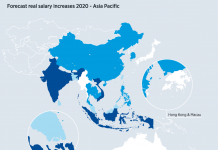Indonesia’s government remains rather optimistic and upbeat that the sweeping omnibus bill on job creation will lead to an increased interest in investment and open up more jobs for Indonesians. However, it must brace itself for tough public scrutiny during the bill’s deliberation at the House of Representatives.
The omnibus bill on job creation could potentially help the government reach its goal of 6 percent economic growth through Rp 1,200 trillion (US$87 billion) in projected investment, according to Coordinating Economic Minister Airlangga Hartarto.
Hartarto added that under a “business as usual” scenario, Indonesia would attract between Rp 800 trillion and Rp 900 trillion in investment per year. This means that the omnibus bill could potentially add more than Rp 300 trillion in investment into Indonesia. The country booked Rp 810 trillion in investment in 2019 from domestic and foreign investors, Coordinating Investment Board (BKPM) data shows.
“To reach the economic growth target of 6 percent, we need faster decision-making, a faster licensing process and to ease the doing of business for small and medium businesses,” Hartarto said during an interview with The Jakarta Post. He referred to gross domestic product (GDP) growth targets in the 2020-2024 National Medium Term Development Plan (RPJMN).
“We are targeting 3 million new jobs in the manufacturing sector, start-up companies and part-time workers,” he added.
Indonesia at present adds around 2 million jobs per year. With a young and growing population, this number is not sufficient to keep up with high school and university graduates entering the job market.
President Jokowi’s administration submitted the omnibus bill on job creation on 12 February to the House, expecting most of the deliberations to be concluded within 100 working days so as to attract more investment to help boost the country’s current anaemic growth rate.
Hartarto added that the government’s omnibus bill would play a huge role in opening up financial access for SMEs. It will do so by relaxing regulations in order to allow SMEs to become formal companies. “This will change the informal sector into a formal one,” Hartarto says.
Indonesia’s economy grew 5.02 percent in 2019, the lowest growth rate in four years, stemming from a cooling attitude towards investments and lower exports. Investments are the second largest contributors to Indonesia’s GDP growth and expanded 4.45 percent in 2019; a far cry from the 6.67 percent growth rate recorded in 2018.
“The omnibus bill is the government’s plan to boost investment and we really need to kick-start economic growth. The misnomers we are seeing right now are being caused by a lack of communication between the government and related stakeholders, such as investors and labor unions,” Center of Reform on Economics (CORE) Indonesia research director Piter Abdullah told The Post.
“Indonesia needs a breakthrough and the omnibus bill is that breakthrough. But the government should have communicated the proposed plan more clearly. The omnibus legislation should be drafted carefully and not be rushed.”
For this year, the government has set a 5.3 percent economic growth target, as documented in the 2020 state budget. However, this target has come under criticism by economists who believe it is unrealistic, especially with the ongoing COVID-19 crisis which is expected to drag down economic growth in China, Indonesia’s largest trading partner and second-largest foreign investor.
“A drop of just one percentage point in China’s economic growth rate will result in a drop of 0.3 to 0.6 percentage points in Indonesia’s growth,” Finance Minister Sri Mulyani Indrawati said during a recent media briefing in Jakarta.






















